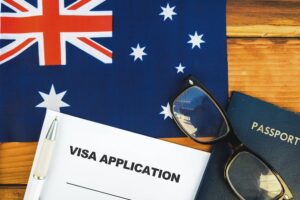
The fiancé K-1 nonimmigrant visa is for a foreign-national fiancé of a United States citizen. The K-1 nonimmigrant visa allows the foreign citizen fiancé to travel to the U.S. and marry their United States citizen sponsor within 90 days of arriving in the United States.
The foreign nationals then apply for adjustment of status to a permanent resident status(LPR) with the U.S. Citizenship and Immigration Services (USCIS) and the Department of Homeland Security (DHS). Because a fiancé visa allows the foreign citizen to immigrate to the United States and marry a U.S. resident shortly after arrival in the country, the fiancé must meet some requirements of an immigrant visa.
What is a K1 Fiance Visa?
Under American immigration law, a foreign-national fiancé of a United States citizen is an approved petitioner for Alien Fiancé, Form 1-129F. The foreign-citizen fiance is then issued a nonimmigrant K-1 visa for travel to the United States to marry their United States citizen fiancé.
Both the K-1 visa applicant and the U.S. citizen must be legally free to marry at the time when the petition is filed and must remain so thereafter. Their marriage must be legally possible under the laws of the United States where the marriage will take place.
Typically, the U.S. citizen sponsor and the foreign-citizen fiancé must have met in person within the last two years. However, the United States Citizenship and Immigration Services (USCIS) may grant an exception to this requirement if there is extreme hardship that bars the U.S. citizen sponsor from meeting their foreign-citizen fiancé in person, or, for example, if it’s contrary with the foreign-citizen fiancé’s or the U.S. citizen sponsor’s culture for a man and woman to meet before their wedding.
What Is the K1 Visa Process?
Before starting the application process for a K1 Fiancé nonimmigrant visa, the United States citizen must meet the following requirements before filing a petition for a Fiancé visa:
- The person must be a United States citizen.
- He or she must have met with your fiancé within the last two years and provide evidence of your meeting. In extreme circumstances, the meeting requirement might be waived, especially where there are instances of extreme hardship or an inability to meet because of religious or cultural reasons.
- You and your foreign-citizen fiancé must be free and eligible to marry legally at the time when the petition for the alien Fiancé is filed and remain so thereafter. This means that both you and your fiance must be unmarried, or that any previous marriage has ended in divorce, annulment, or death and you have the legal documentation to prove it.
- You and your foreign-national fiancé must have a serious intention to marry within 90 days of your fiancé traveling into the United States.
- Finally, you will have to submit an Affidavit of Support to show that you can support your foreign-citizen fiance financially once they move to the United States. If the U.S citizen’s fiance doesn’t meet the income requirement, often they can meet the income requirements through a co-sponsor.
The first step in getting a K1 visas entails the filing of a Petition for the alien fiancé by the United States who is also known as the Petitioner. The petitioner files this Petition with the United States Citizenship and Immigration Services (USCIS) and they must send the petition to the appropriate USCIS Service Center, which is located near the geographic residency of the U.S. Citizen.
This petition is called the Petition for Alien Fiancé or I-129F petition. It’s crucial to note that you can’t file form I-129F while you’re abroad and that the Petition for Alien fiance is only valid for four months once USCIS approves it. However, a United States Consular official can extend the petition for the complete processing of the visa application.
Once you have filed your I-129F Petition with USCIS, here’s what you should expect during the fiance visa process:
- Application accepted – If you file your application properly, USCIS will issue a receipt number and notify you that your application has been accepted.
- Initial review – During this procedure, USCIS conducts a criminal background check on the petitioner and identifies and/or addresses any matters that need to be addressed.
- Request for evidence – If your application has omissions or contains incomplete information, or the USCIS wishes to review some of your information further, you’ll receive a request for additional evidence.
- Response review – Once the USCIS receives any evidence that was requested, immigration officials will review it and the K-1 visa application process will continue.
- Decision – During the last step, the USCIS reaches a decision and mails or emails a notice to the petitioner.
What are the Documents Required to get a K-1 fiance Visa?
The foreign-national fiancé and eligible minor children applying for K-2 visas must bring the following documents and forms to the visa interview:
- Online Nonimmigrant Visa Application, and a completed Form DS-160. You and any eligible children applying for K-2 non-immigrant visas must bring:
- A Completed Form DS-160, and
- A printed DS-160 confirmation page for your immigration interview.
- A passport, which is valid for travel to the US and with a validity date of at least six months beyond your intended period of stay in the United States unless country-specific guidelines offer exemptions.
- Birth certificate.
- Divorce or death certificates of any previous spouses for both the foreign-national fiance and the U.S. citizen fiance.
- Medical examination reports
- Police certificates from your current country of residence and all the countries where you have lived for six months or more since you turned 16. Also, police certificates are required for children age 16 or older)
- Evidence of financial support. Affidavit of Support or Form I-134 may also be required.
- Two photographs.
- Proof of relationship between you and your U.S. citizen fiancé
- Payment of fees
It’s essential to note that the consular officer may request additional information, such as photos and other evidence that the relationship with your foreign-national fiancé is genuine. Documentations in foreign languages, other than the language of the country where the application takes place, must be translated. You and your fiance must take and legible photocopies to the fiance visa interviews, such as birth and divorce certificates. Any original documents you submit will be returned.
Does My United States Citizen Fiancé Need to File Separate Petitions for My Children?
No. Your eligible children need to apply for K-2 visas based on the approval of Petition for Alien Fiancé or Form I-129F, which your United States citizen fiancé filed on your behalf. However, your United States citizen fiancé needs to list your children on the petition. Separate visa applications must be submitted for every K-2 visa applicant, and every applicant must pay the costs of the applications.
After your marriage, your children must file separately from you for adjustment of status. They can’t be part of your application for adjustment of status. For additional information about adjustment of status check the USCIS’s website under Green Card (Permanent Residence).
It’s essential to note that under U.S. immigration law, eligible children must be unmarried. To file for adjustment of status for your children after your marriage to your U.S. citizen spouse, the kid’s stepchild relationship with your spouse must be created before the kid reaches the age of 18.
How Long Does it Take To Get A K1 Fiance Visa From The United States Embassy?
Expect the process to take anywhere from 60 to 120 days working with the United States Embassy or Consulate to get your K-1 visa. Unfortunately, the time it takes to get a K1 Fiance visa after the United States Embassy or Consulate receives your K-1 visa petition varies from country to country and from case to case.
Once the US Embassy or Consulate approves your K1 visa application, expect to receive your K1 visa within a few days. From the day your K1 visa is issued, your foreign fiance has a period of six months to travel to the U.S. Once they’re allowed entry into the U.S., they have 90 days to marry you.
Eligible kids of K-1 applicants should file for K2 visas and must file their applications separately and pay all applicable visa application fees. The U.S petitioner must list the children on Form I-129F. The kids of a Fiance visa holder may enter the U.S. with the fiance or within 6 months of the issuance of the visa.
Contact an Experienced Immigration Lawyer for Legal Help with K-1 Visa Application
The experienced immigration attorneys at The Law Office of Jason A. Dennis are here to support you in your complex legal process of applying for a K-1 fiancé visa. We provide routine visa services and we can help you, your fiancé, and your children get the K-1 nonimmigrant visa. If you are searching for an experienced immigration lawyer in New York for a K-1 visa, our legal team is here to represent you. Contact our New York City immigration law firm today at (347) 868-6100 with any questions you may have.

